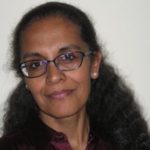Interviewer: Savannah Van Why
Interview Date: February 12, 2018
Location: Agricultural and Life Sciences Building, Oregon State University
Duration: 1:31:16
Indira Rajagopal discusses her upbringing in northeastern India. She goes into detail about going on walks with her parents during her childhood, traveling with her father to symposiums, and her mother’s passion for making science accessible to non-English-speaking Indian children.
She describes her undergraduate education as well as the book that inspired her to study biochemistry and her later work toward her doctorate at the Indian Institute of Science. She talks about her post-doc work at the University of California San Diego and her decision to work at Oregon State University.
Rajagopal proceeds to discuss her work under Dr. Christopher Mathews at Oregon State University, including her first teaching experience. She mentions that she became an official instructor after she began to regularly teach classes and that she began mentoring and advising students at the same time.
Rajagopal describes the higher level of structure students want in classes today compared to what they were used to. She also discusses how there were students who resisted taking Baccalaureate Core classes and activities and how she reminded them of the importance of these classes. She describes specific cases of students who were later grateful to be pushed out of their comfort zones; she taught them to defy the socially constructed mental boxes in which people are placed in by society. Rajagopal finished discussing her experience as an advisor and mentor and says recently graduated students often contact her for advice or to just talk about their current affairs.
Finally, Rajagopal discusses her ideas of the concepts of gender, including the differences between educated and rural India’s views of gender. She explains the expectations that are placed on women and dual-working household families in the United States. She concludes by mentioning the gender ratio of OSU recipients who receive the Goldwater Scholarship and the importance of women like, for example, those on Oregon State’s Women’s Basketball team.
Dublin Core
Title
Description
She describes her undergraduate education as well as the book that inspired her to study biochemistry and her later work toward her doctorate at the Indian Institute of Science. She talks about her post-doc work at the University of California San Diego and her decision to work at Oregon State University.
Rajagopal proceeds to discuss her work under Dr. Christopher Mathews at Oregon State University, including her first teaching experience. She mentions that she became an official instructor after she began to regularly teach classes and that she began mentoring and advising students at the same time.
Rajagopal describes the higher level of structure students want in classes today compared to what they were used to. She also discusses how there were students who resisted taking Baccalaureate Core classes and activities and how she reminded them of the importance of these classes. She describes specific cases of students who were later grateful to be pushed out of their comfort zones; she taught them to defy the socially constructed mental boxes in which people are placed in by society. Rajagopal finished discussing her experience as an advisor and mentor and says recently graduated students often contact her for advice or to just talk about their current affairs.
Finally, Rajagopal discusses her ideas of the concepts of gender, including the differences between educated and rural India’s views of gender. She explains the expectations that are placed on women and dual-working household families in the United States. She concludes by mentioning the gender ratio of OSU recipients who receive the Goldwater Scholarship and the importance of women like, for example, those on Oregon State’s Women’s Basketball team.

